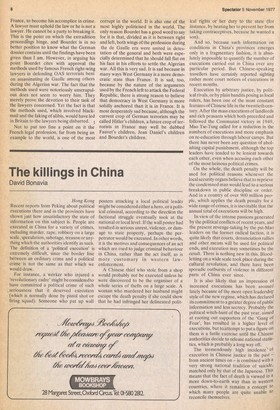The killings in China
David Bonavia
Hong Kong Recent reports from Peking about political executions there and in the provinces have shown just how unsatisfactory the state of information on this subject is. People are executed in China for a variety of crimes, including murder, rape, robbery on a large scale, speculation, sabotage, treason or anything which the authorities identify as such. The definition of a 'political execution' is extremely difficult, since the border line between an ordinary crime and a political crime is not the same as that which we would draw.
For instance, a worker who injured a 'revolutionary cadre' might be considered to have committed a political crime of such , seriousness that it deserved execution (which is normally done by pistol shot or firing squad). Someone who put up wall posters attacking a local political leader might be considered either a hero, or a political criminal, according to the direction the factional struggle eventually took at the national or local level. If the wall poster had resulted in serious unrest, violence, or damage to state property, perhaps the perpetrator would be executed. In other words, it is the motives and consequences of an act which are used to judge criminal behaviour in China, rather than the act itself, as is more customary in western lawenforcement.
A Chinese thief who stole from a shop would probably not be executed unless he were discovered to be the organiser of a whole series of thefts on a large scale. A woman who murdered her husband might escape the death penalty if she could show that he had infringed her delineated polit ical rights or her duty to the state (for instance, by beating her to prevent her from taking contraceptives, because he wanted a son).
And so, because such information on conditions in China's provinces emerges only in a fragmentary fashion, it is absolutely impossible to quantify the number of executions carried out in China over any particular period. But Chinese-speaking travellers have certainly reported sighting rather more court notices of executions in recent months.
Execution by arbitrary justice, by political rivals, or by plain bandits posing as local rulers, has been one of the most constant features of Chinese life in the twentieth century. After the mass executions of landlords and rich peasants which both preceded and followed the Communist victory in 1949, Mao Tse-Tung called for a reduction in the numbers of executions and more emphasis on re-education through labour camps. But there has never been any question of abolishing capital punishment, although the top leaders have tended to be lenient towards each other, even when accusing each other of the most heinous political crimes.
On the whole, the death penalty will be used for political reasons whenever the local security organs believe that to reprieve the condemned man would lead to a serious breakdown in public discipline or order. And in a country of over 900 million people, which applies the death penalty for a wide range of crimes, it is inevitable that the annual total of executions will be high.
In view of the intense passions generated by the political conflicts of recent years, and the present revenge-taking by the pst-Mao leaders on the former radical faction, it is quite likely that courts, denunciation rallies and other means will be used for political ends, and execution may sometimes be the result. There is nothing new in this. Bloodletting on a wide scale took place during the cultural revolution, and there have been sporadic outbursts of violence in different parts of China ever since.
It is also likely that an impression of increased executions has been aroused lately because of the more open leadership style of the new regime, which has declared its commitment to a greater degree of public information and less secrecy. Probably the political witch-hunt of the past year, aimed at rooting out supporters of the 'Gang of Four', has resulted in a higher level of executions, but to.attempt to put a figure on them is a futile exercise until the Chinese authorities decide to release national statistics, which is probably a long way off. The tremendously high incidence' of execution in Chinese justice in the past from ancient times on is combined with a very strong national tradition of suicide, matched only by that of the Japanese. This means that the fact of death is viewed in a more down-to-earth way than in western countries, where it remains a concept to which many people are quite unable to reconcile themselves.


































 Previous page
Previous page